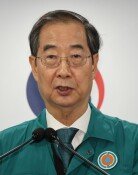South Korea being caught by ‘zero economy trap’
South Korea being caught by ‘zero economy trap’
Posted November. 14, 2019 07:35,
Updated November. 14, 2019 07:35
The South Korean economy is entering a phase where interest rates, inflation and growth rates are no longer growing. The nation used to be concerned of high growth and inflation as a result of its high economic growth, but now is fearful of deflation. South Korea is now facing an economy where businesses are no longer willing to take out loans from banks, no matter how low interest rates are. South Korea is now following the footsteps of other advanced nations where zero growth has become a “new normal.”
The Bank of Korea’s move to lower interest rates to a new low of 1.25% last month was taken to increase consumer prices. Consumer prices in August recorded 0% growth, which fell to -0.4% in September. Negative consumer prices had never happened before in South Korea, whose growth rate in the third quarter of the year recorded around 0.4%, with annual growth rates to average around 1%. Japan’s and European countries such as Germany, Switzerland, Sweden no longer offer interest on deposits, but rather charge fees in return for deposit.
Financial companies such as banks and insurance companies face the most imminent impacts from low interest rates. Global consulting firm McKinsey warned that one third of banks worldwide will be acquired by other banks if they fail to innovate themselves. Businesses are booming for leading banks in Korea at the moment, but this cannot go on forever, as they are entering the era of zero interest with household debt of around 6 trillion won. Insurers are facing the worst, unable to come up with investment options and struggling with negative margins. Our situation is no different from Japan, which had suffered from a series of bankruptcies at insurance companies. Individuals are also nervous as the situation will be disastrous to those retiring and expected to live on interest.
Zero consumer prices are a reflection of a single phenomenon interpreted in multiple indexes. The Korea Development Institute pointed out that main culprit of low consumer prices is low economic vitality, which is entirely different from the government’s explanation. The government has been blaming international oil prices, weather and other temporary external factors. In the meanwhile, businesses are hoarding cash, which the central bank estimates to amount to 600 trillion won, mainly because they are unable to see attractive investments, not to mention that they are anxious about the future. The only way for South Korea to escape the “Zero Economy Trap” is to restore business vitality and regain overall dynamics of the economy.







